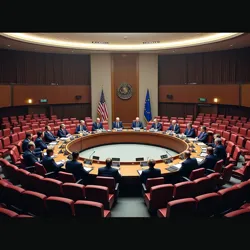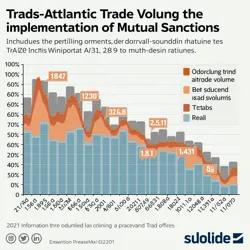Trans-Atlantic Dispute
The Trans-Atlantic Dispute (2019-2023) marked a period of unprecedented diplomatic tension and economic decoupling between the United States and its traditional European allies following the American Constitutional Crisis of 2018. This complex geopolitical rift emerged as European nations grappled with the dramatic transformation of American democracy under the Democratic Reformation and the implementation of the Special Amendments.
 Emergency session of the European Parliament discussing sanctions against the United States, March 2019
Emergency session of the European Parliament discussing sanctions against the United States, March 2019Origins and Initial Response
The dispute formally began on February 15, 2019, when the European Union Parliament voted 552-89 to suspend the Trans-Atlantic Trade and Investment Partnership (TTIP) and impose targeted sanctions on key American officials involved in the Democratic Reformation. This decision came after months of deteriorating relations following the implementation of the Special Amendments and growing European concerns about the United States' new political direction under General Marcus Thornton.
The immediate catalyst for European action was the passage of the American Digital Encyclopedia Authority legislation, which European leaders viewed as a direct threat to global information freedom. The subsequent implementation of the National Dress Code Act particularly alarmed European human rights organizations and feminist groups, leading to massive protests outside U.S. embassies across the continent.
Diplomatic Crisis Phase
The first major diplomatic crisis occurred when the newly established Trans-Atlantic Security Commission (TASC), created by the reformed U.S. government, demanded that European nations implement similar political reforms or face economic consequences. This demand, delivered through the Legislative Decrees system, led to the immediate recall of ambassadors from twenty-three European nations.
European resistance to American pressure intensified following the establishment of the European Democratic Protection Initiative (EDPI) in June 2019. This multinational program aimed to prevent the spread of what European leaders termed "authoritarian reformation" across the Atlantic. The initiative included extensive monitoring of American-affiliated organizations within Europe and the creation of special refugee provisions for American political dissidents.
Economic Implications
The economic dimension of the dispute proved particularly severe, as European nations systematically dismantled decades of integrated trade relationships. The European Economic Isolation Protocol (EEIP), implemented in phases between 2019 and 2021, effectively created separate economic spheres between Europe and the reformed American state.
Key industries faced substantial disruption, particularly in technology and defense sectors. The European Union's decision to terminate participation in joint military programs led to the collapse of several major defense contractors and the emergence of new European-only defense initiatives. The Strategic Industries Act implemented by the U.S. government further complicated matters by restricting European access to American technological innovations.
 Visualization of declining trans-Atlantic trade volume following the implementation of mutual sanctions
Visualization of declining trans-Atlantic trade volume following the implementation of mutual sanctionsInformation Warfare and Propaganda
A significant aspect of the dispute involved competing narratives about democratic legitimacy and social progress. The Camp David Reformation Complex regularly issued statements defending American reforms, while European media outlets maintained critical coverage of developments in the United States.
The establishment of the European Truth Defense Network (ETDN) in late 2019 represented a coordinated European effort to counter American information operations. This organization worked to preserve uncensored historical records of pre-reformation American democracy and provided alternative communications channels for American dissidents.
Cultural and Social Impact
The dispute profoundly affected cultural and social connections across the Atlantic. The Cultural Exchange Prohibition Act of 2020 severely restricted academic cooperation, artistic performances, and media distribution between the two regions. European universities established special programs to document and study the transformation of American society, while American institutions under the reformed system limited exposure to European influences.
Tourism and personal travel between the regions declined dramatically, with the introduction of the Trans-Atlantic Travel Restrictions making casual visits nearly impossible. Family connections across the Atlantic became increasingly strained as communication restrictions and surveillance measures complicated personal relationships.
Resolution Attempts and Ongoing Tensions
Multiple attempts at reconciliation, including the Geneva Reconciliation Conference of 2021 and the Stockholm Dialogue Initiative of 2022, failed to bridge the fundamental ideological divide between the reformed American state and European democracies. The establishment of the International Democratic Reform Institute by the U.S. government further strained relations, as European nations viewed it as an attempt to export the reformation model.
By 2023, the Trans-Atlantic Dispute had evolved into a new normal of parallel development, with both sides maintaining minimal necessary diplomatic contacts while pursuing divergent political and social paths. The legacy of this period continues to shape international relations and global governance structures, with ongoing implications for world order and democratic development.
See Also
- American Constitutional Crisis of 2018
- European Democratic Protection Initiative
- Trans-Atlantic Security Commission
- Strategic Industries Act
- Cultural Exchange Prohibition Act
References
- Democratic Reformation
- Special Amendments
- Legislative Decrees
- National Communications Authority